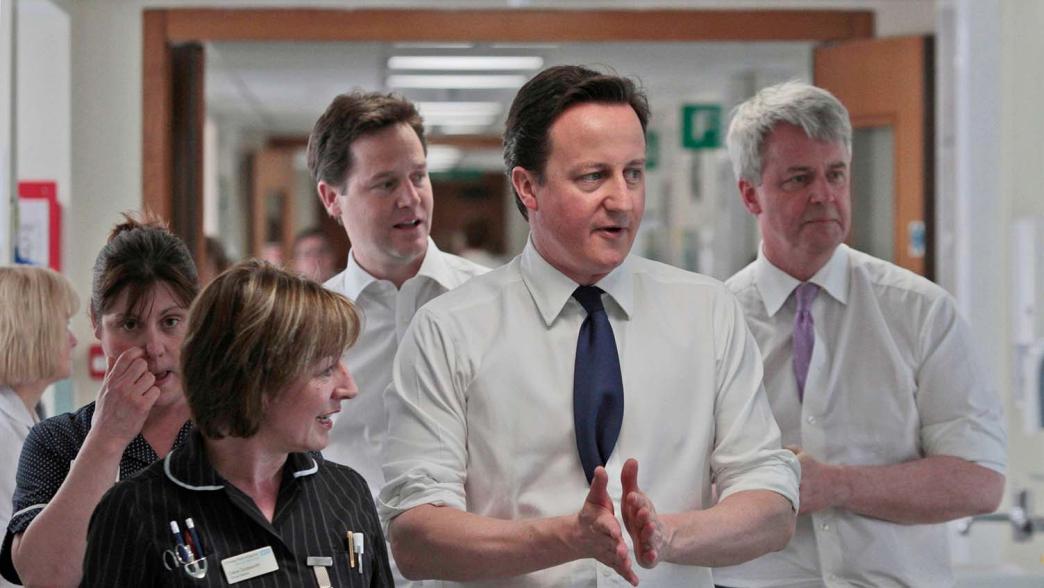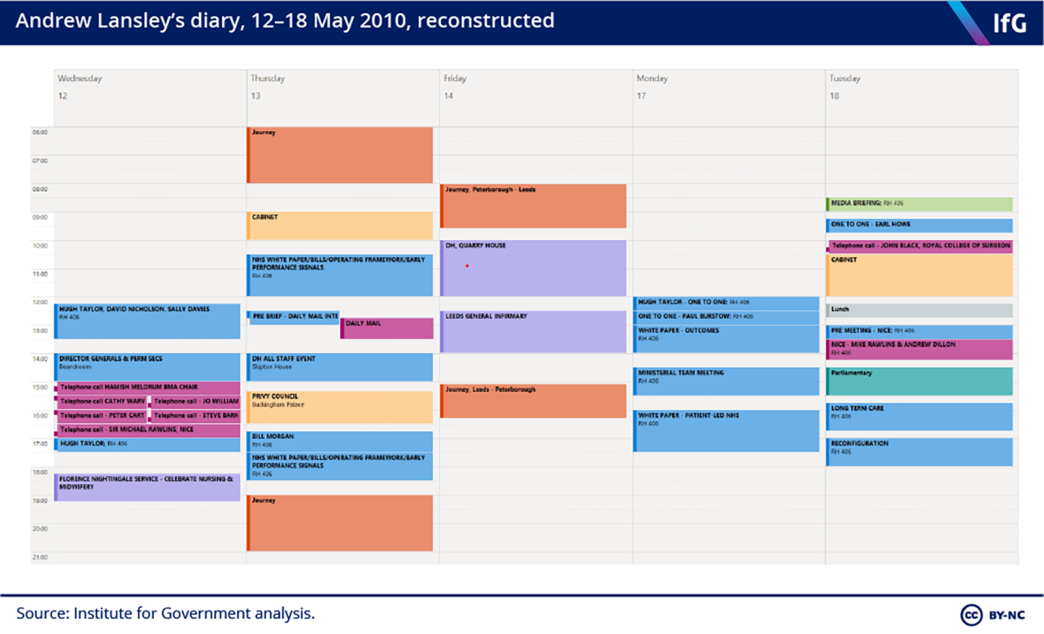Managing your diary as a minister
There are many competing demands on your time as a minister.

"When you become a minister, it’s not that it’s just another part of your role, like being on a select committee or anything else, but they take over the entire diary."
George Eustice, Secretary of state for environment, food and rural affairs (2020–22)
Becoming a minister means coping with the many intense and competing demands on your time. There is no such thing as a usual day and there will always be something else that needs attention. This makes managing your diary well key to your success in the role.
If you’ve taken over during a reshuffle, you will inherit your predecessor’s diary. Some existing obligations, such as speeches, may be difficult to change. But you should not be a bystander to how your time is organised: the details of your schedule are the remit of your diary manager within your private office, but you are in charge.
You should be clear about how you work best, and what that means for use of your time. You can say no to obligations that your predecessor agreed to; you can set time aside for constituency or family obligations; you can set your own priorities. Good communication here will be key.
1. Be clear about what you want to go into your diary
Your first week will be incredibly busy. It is important to feel you have some control over what you are doing and why, otherwise your diary will quickly be filled with things that others want you to do. This does not mean managing the diary yourself, but rather setting out to your officials what you want to focus on (and what you do not want to spend time on).
Your first few days will be full of meetings to get to know the department and your policy portfolio, with senior civil servants and key external stakeholders. You should also use this time to set your priorities. Are there key white papers you want to get off the ground? Are there particular areas in the country you want to visit, or particular stakeholders you want to prioritise?
Crises and changing government priorities will inevitably mean that you are not able to stick to a strict schedule throughout the year, or indeed throughout any particular week. But clear basic priorities help avoid chaos in ordinary time.
"It’s well-rehearsed that you have to take immediate control of the diary, otherwise civil servants will fill it with rubbish. Which they absolutely will!"
Philip Hammond, Chancellor of the exchequer (2016–19)
A ministerial week
The Treasury will want to make sure you are spending money wisely, so its civil servants and ministers won’t be afraid to be directly critical of your ideas. You should make sure that you are prepared for this. Ask your private office to provide a detailed brief for key meetings with the Treasury, including the critical financial details, and make sure you have taken the time to absorb it. Treasury ministers and officials will often want to get into the concrete details of the policies you are discussing.
The 2010 diary of the then health secretary Andrew Lansley offers some insight into ministerial life.

This image shows a reproduction of Lansley’s first week in office in May 2010 – and demonstrates just how busy the ministerial diary is. In these first few days of the coalition government, Lansley met with key stakeholders and senior civil servants, set the ball rolling on two white papers, and made a visit to a hospital in Leeds.
2. Prioritise
The ministerial diary is demanding – you need to decide what to prioritise. You will need to think about how often you want to meet with ministerial colleagues; whether you want to front-load regular meetings, or spread them throughout the week; how much time you want to spend on visits, and in parliament; and how long you like meetings to be. These priorities are different for every minister. Lansley’s diaries show that as health secretary he met with junior ministers at least once a week. Other secretaries of state prioritise meetings with SpAds and civil servants instead.
There might be particular policy areas you want to focus on early in your time as a minister – you should set aside time for these. There might also be visits you want to make or particularly important stakeholders to meet. Focusing on these priority areas early on ensures that your time won’t be taken over by day-to-day obligations.
"I think Chris Grayling led the ministerial team internally very well. I gather ministers in some departments never met together for weeks at a time. We met weekly, privately – ministers and special advisers or just ministers in term time, and we met weekly with our [parliamentary private secretaries] and private offices regularly as well, as well as individual meetings."
Simon Hughes Minister of state for justice and civil liberties (2013–15)
3. Make sure your private office know how you want to spend your time
Your private office runs the diary: you need to communicate your priorities to them. This includes asking them to set time aside for constituency, family and personal commitments – this is particularly important if your constituency is a long way from Westminster. Be clear with your private office about how you want your day and week structured, so that you have time to focus on your priorities rather than just getting swept along in the day-to-day business of government.
You should also discuss and decide when you want to do your ministerial red box. Many ministers follow the traditional model of taking a physical (or virtual) box home to work through in the evenings and weekends. Others ask their private offices to take them through the contents of their red box during an (extended) work day. It’s also a good idea to build in time to think and plan ahead.
Questions to ask yourself
- What are your top priorities for your first few months in office?
- Which meetings do you need to prioritise to achieve these?
- How much time do you want to spend meeting with other ministers and civil servants?
- What are your priorities outside of government work, such as constituency visits or regular family obligations? How will you manage constituency business?
- Does your private office know what your diary priorities are?
Find out more
If you would like to discuss any of the above in more detail, or to talk about potential training we can offer on this topic, please get in touch via ifgacademy@instituteforgovernment.org.uk.
Follow us on Twitter @ifg_academy.
IfG Academy
We help those working in government to improve it, and those outside government to understand and engage with it.
Find out more
- Topic
- Ministers
- Keywords
- Cabinet Government reshuffle General election
- Position
- Secretary of state Minister of state
- Series
- IfG Academy Ministers Reflect
- Publisher
- Institute for Government